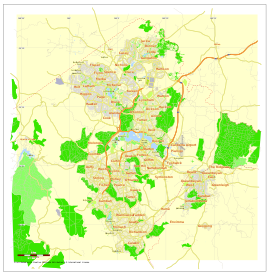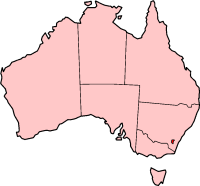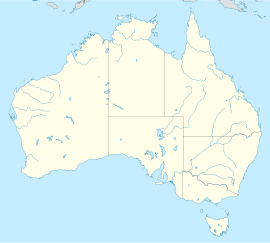Canberra
Canberra is the capital city of Australia. There are 403,468 people who live there.[2] It does not belong to a state but it is in the Australian Capital Territory (ACT).
| Canberra Ngambri[1] Australian Capital Territory | |||||||||
|---|---|---|---|---|---|---|---|---|---|
 Canberra, from top left to bottom right–the city viewed from Mount Ainslie, the Land Axis featuring Old Parliament House and New Parliament House, the Australian War Memorial, the National Carillon, the National Gallery of Australia and the National Library of Australia on Lake Burley Griffin | |||||||||
 City map plan of Canberra | |||||||||
 | |||||||||
| Coordinates | 35°17′35″S 149°07′37″E / 35.29306°S 149.12694°E | ||||||||
| Population | 456,692 (June 2022)[2] (8th) | ||||||||
| • Density | 503.932/km2 (1,305.18/sq mi) | ||||||||
| Established | 12 March 1913 | ||||||||
| Elevation | 578 m (1,896 ft)[3] | ||||||||
| Area | 814.2 km2 (314.4 sq mi)[4] | ||||||||
| Time zone | AEST (UTC+10:00) | ||||||||
| • Summer (DST) | AEDT (UTC+11:00) | ||||||||
| Location | |||||||||
| Territory electorate(s) | |||||||||
| Federal division(s) | |||||||||
| |||||||||



Canberra was started in 1913 and in the middle of the city is Lake Burley-Griffin. This lake was created especially for the city. There was a competition to design the new capital city of Australia. The competition was won by an architect from Chicago in the United States of America. His name was Walter Burley Griffin. Griffin designed his triangular town as a garden town, so its size expanded over a big area. But as Canberra grew larger and larger, the lake was no longer in the middle of the town, but the people who are in charge of planning the city make sure Canberra is as close to Griffin's original plan as possible. Canberra has a size in area nearly as big as Berlin, but the number of people who live there is much smaller.
Before Canberra was founded, Australia’s two most important cities, Sydney and Melbourne, were arguing which city should be the capital of the continent. First, Melbourne was elected the capital, but in 1908 there was a vote. The result: an area of 2400 square kilometers was given to the country by New South Wales to build Canberra in. This was the place, 300 kilometers away from Sydney and with a distance of 650 kilometers to Melbourne, where a few years later Canberra was built.
The name Canberra is pronounced in various ways and most commonly now as "CAN-brugh" making it sound almost an English name - Canborough ! Some say "CAN-buh-ruh" ; a small number of people may pronounce it "can-BEAR-ruh" ; at an earlier time "can-BERR-a" was very common and that form is still heard although often looked down upon as ignorant and incorrect. But while now an uncommon pronunciation it may be closest to the original name and pronunciation. In the 19th century a farming property on the Limestone Plains was named "Canberry" (or "Camberry") and some think this name is derived in turn from the name of the local tribe - the Ngambri or Kamberra or Camberri people. (Others have suggested the name is derived from an Aboriginal word meaning "meeting place").
Canberra has an oceanic climate (Cfb in the Köppen climate classification). Due to Canberra's inland location and fairly high altitude, summers are warm to hot with frequent heat waves and droughts and winters are fairly cold with frequent frosts during the nights. Snow is only common on the mountains.
Tourists who visit Canberra come to see the many national monuments and other famous sights. Some places to visit are the Government House, Parliament House, the High Court of Australia, the Australian War Memorial, the National Gallery of Australia, the Royal Australian Mint, Telstra Tower, the National Library of Australia, and the National Museum of Australia.
References
change- ↑ "Do you know what Aboriginal land you're on today?". 4 July 2022.
- ↑ 2.0 2.1 "Regional population, 2021-22". Australian Bureau of Statistics. 20 April 2023. Retrieved 27 April 2023.
- ↑ "GFS / BOM data for CANBERRA AIRPORT". Archived from the original on 9 July 2015. Retrieved 16 June 2018.
- ↑ "Planning Data Statistics". ACT Planning & Land Authority. 21 July 2009. Archived from the original on 2 August 2008. Retrieved 13 May 2010.
- ↑ "Great Circle Distance between CANBERRA and SYDNEY". Geoscience Australia. March 2004. Archived from the original on 7 January 2019. Retrieved 2 May 2016.
- ↑ "Great Circle Distance between CANBERRA and MELBOURNE". Geoscience Australia. March 2004. Archived from the original on 7 January 2019. Retrieved 2 May 2016.
- ↑ "Great Circle Distance between CANBERRA and ADELAIDE". Geoscience Australia. March 2004. Archived from the original on 7 January 2019. Retrieved 2 May 2016.
- ↑ "Great Circle Distance between CANBERRA and BRISBANE". Geoscience Australia. March 2004. Archived from the original on 7 January 2019. Retrieved 2 May 2016.
- ↑ "Great Circle Distance between CANBERRA and PERTH". Geoscience Australia. March 2004. Archived from the original on 7 January 2019. Retrieved 2 May 2016.
- ↑ Augmented Electoral Commission for the Australian Capital Territory (July 2018). "Redistribution of the Australian Capital Territory into electoral divisions" (PDF). Archived (PDF) from the original on 16 September 2018. Retrieved 16 September 2018.
The electoral divisions described in this report came into effect from Friday 13 July 2018 ... However, members of the House of Representatives will not represent or contest these electoral divisions until ... a general election.
